People who are diagnosed with psoriasis by doctors after the examination, in most cases, face certain difficulties in treatment, without a positive result. Here only strict adherence to complex systematic therapy prescribed by the doctor can help.
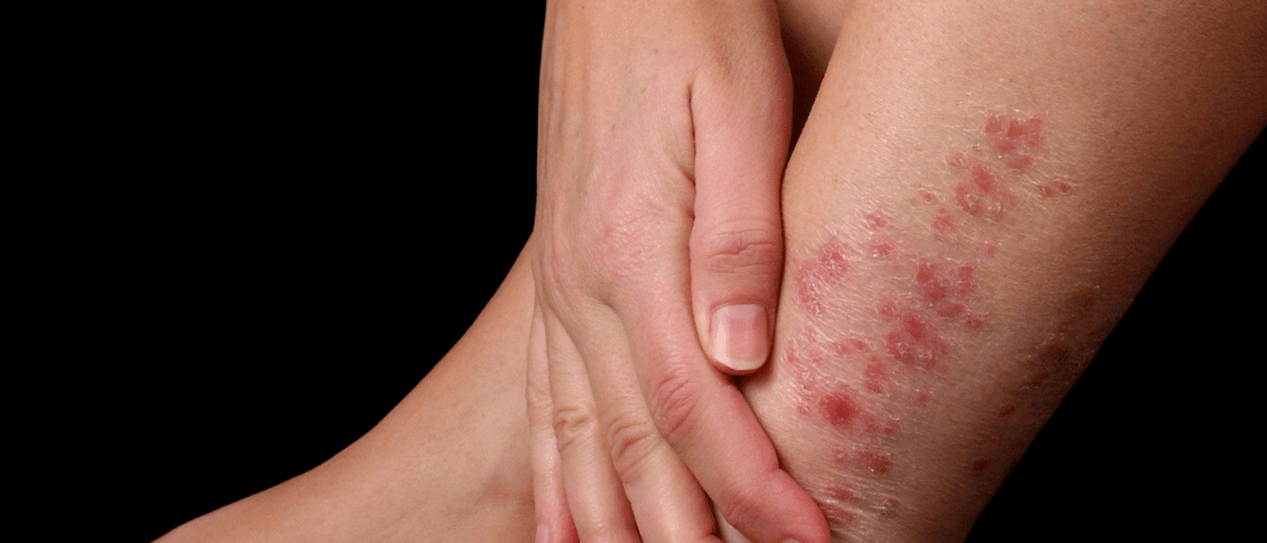
Today, in medical practice, many traditional and experimental methods are used to treat this ailment. Few of these can completely save a person from pathology, but with the right approach, you can lead a full lifestyle for a long time, without physiological and cosmetic discomfort.
The essence of pathology.
Psoriasis is a skin disease that takes on a chronic form in a relatively short time.The pathology is characterized by the appearance and fairly rapid spread of numerous unsightly pink and reddish bulging plaques, which are covered with completely dead skin scales.
Psoriasis is not infectious in nature, therefore it cannot be transmitted from a sick person to a healthy person.
The mechanism of action of the pathology is based on the fact that, due to a certain malfunction in the body, in some areas of the dermis, cell division is significantly accelerated. The connections between cells are completely lost, which automatically causes the appearance of scales.
The natural immune system begins to react to such a phenomenon, which automatically leads to the appearance and development of the inflammatory process. Medications prescribed by doctors are aimed at stopping and completely blocking such processes.
The development of the disease usually begins on the surface of the scalp and begins to spread rapidly to all parts of the body.
The reasons for the development of psoriasis
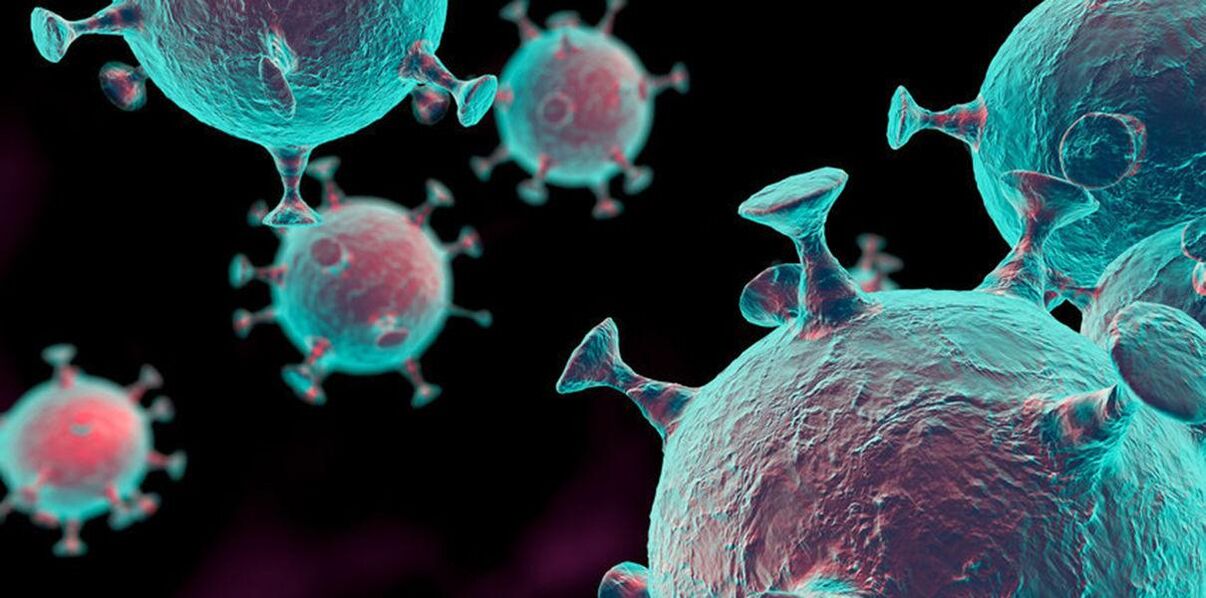
The exact causes of the onset and development of psoriasis have not yet been established. There are only a few hypothetical assumptions supported by research. These are some of the most important reasons:
- Immune. According to many doctors, psoriasis can occur due to the development of autoimmune malfunction in the body. The body's defenses recognize new cells exclusively as foreign and immediately expose them to rejection. A similar failure in the immune system is often seen after burns or other skin injuries.
- Genetic. According to statistics, psoriasis can be inherited. If a person has such genes, when certain provoking factors appear, the disease will manifest itself immediately.
- Endocrine. Scientists are of the opinion that a violation of the natural reproduction of cells may be a consequence of a violation of the general hormonal background. In ordinary women, at certain periods of the standard cycle, various degrees of development of pathology can be observed.
- Neurogenic. This is one of the more recent hypotheses that has been put forward relatively recently. According to this theory, the disease occurs for a specific psychological reason or in the context of a neurosis. It disrupts the natural blood circulation and blood supply, contracts and thins the walls of the blood vessels.
- Viral. It has been shown that with the course of this or that infection, characteristic rashes may appear on the body. This theory is more conjectural than fundamental. The drugs used to completely stop the manifestations show this quite clearly.
- General metabolic disorder. This is one of the main prerequisites for the appearance of various negative disorders in the general state of health of the entire organism. According to the studies carried out, at this time, patients have a slightly low body temperature and their cholesterol level is high. All this indicates a significant violation of natural metabolism.
In the presence of these factors, it is worth immediately undergoing appropriate treatment and taking preventive measures.
Factors causing disease
Along with the causes of the appearance of the disease listed above, there are several special factors that provoke pathology. Certain circumstances that seriously increase the risk of pathology include:
- Frequent stressful experiences.
- Numerous infections that develop in the respiratory tract.
- Long-term use of modern antibiotics.
- Disruption of metabolism.
- Hormonal disorders.
- The abundance of fatty foods in the general diet.
- Addiction abuse.
The listed factors do not independently cause the disease, but can lead to the appearance of characteristic plaques. The more factors that are activated, the greater the risk of developing the disease. In order to get rid of the problem as efficiently and quickly as possible, it is important to use drugs that take such circumstances into account.
The main types of psoriasis.
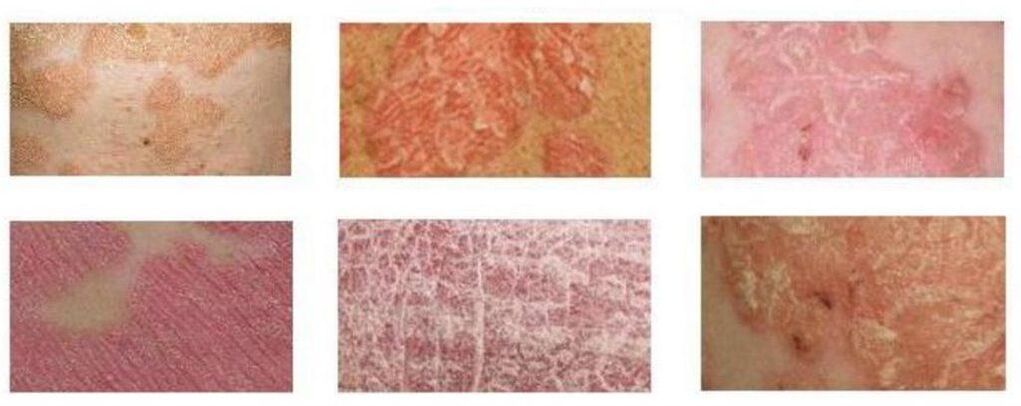
The general nature and severity of the eruption are at quite different levels. Based on these differences, the disease can be classified into specific types. Taking into account such factors and features of the localization of the disease, the following types of pathology can be distinguished:
- License plate. This is the most common type of psoriasis and is characterized by the appearance of plaques with gray scales;
- In the form of a drop. It develops much less frequently than the type presented above. The pathology is characterized by the formation of small convex formations of red and pink color. They are also covered in scales;
- Pustular. In the process of the appearance of a similar form of the disease, small pustules begin to appear on the skin;
- Psoriasis on feet and palms. With this variant of the pathology, the maximum concentration of rashes is localized in certain parts of the body. This is a type of pathology that is quite difficult to treat;
- Exudative. Scales with such a pathology are saturated with special yellowish or whitish secretions, which gradually begin to stick together;
- ErythrodermaMost often, this pathology is the result of the rapid and fairly rapid development of the disease to a complex form. With such a pathology, almost the entire surface of the epidermis is covered with plaques and various spots. During an exacerbation, the patient's lymph nodes swell and the temperature rises.
When developing a treatment regimen for a disease, the doctor necessarily relies on the type of pathology, thus achieving the optimal result in the treatment process.
The main symptoms of psoriasis.
It is necessary to contact an experienced specialist immediately when reddish plaques appear, a distinctive feature of which is the presence of easily removable scales. In order not to confuse educational data with lichens, you should pay attention to some additional symptoms and characteristics of plaques:
- The scales are easily removed from redness and in structure resemble ordinary candle wax.
- After removal of dead cells, films are formed, which are characterized as terminal.
- With severe scratching, bleeding of varying intensity may appear.
- As the disease progresses, completely new plaques form in the injured areas. A barely perceptible border can be seen around the formation.
- With relatively severe development options, the natural structure of the nails is significantly altered and they begin to exfoliate.
- Sometimes there may be joint pain and significant skin tenderness.
- In almost all cases, the disease is accompanied by severe itching. Psoriasis formations should not be combed. This will lead to the progression of the disease and the development of an infection.
- There is some symmetry of the rash on the body.
If you have all of the above symptoms, you should immediately consult a doctor for a competent treatment regimen.
Diagnosis of the disease
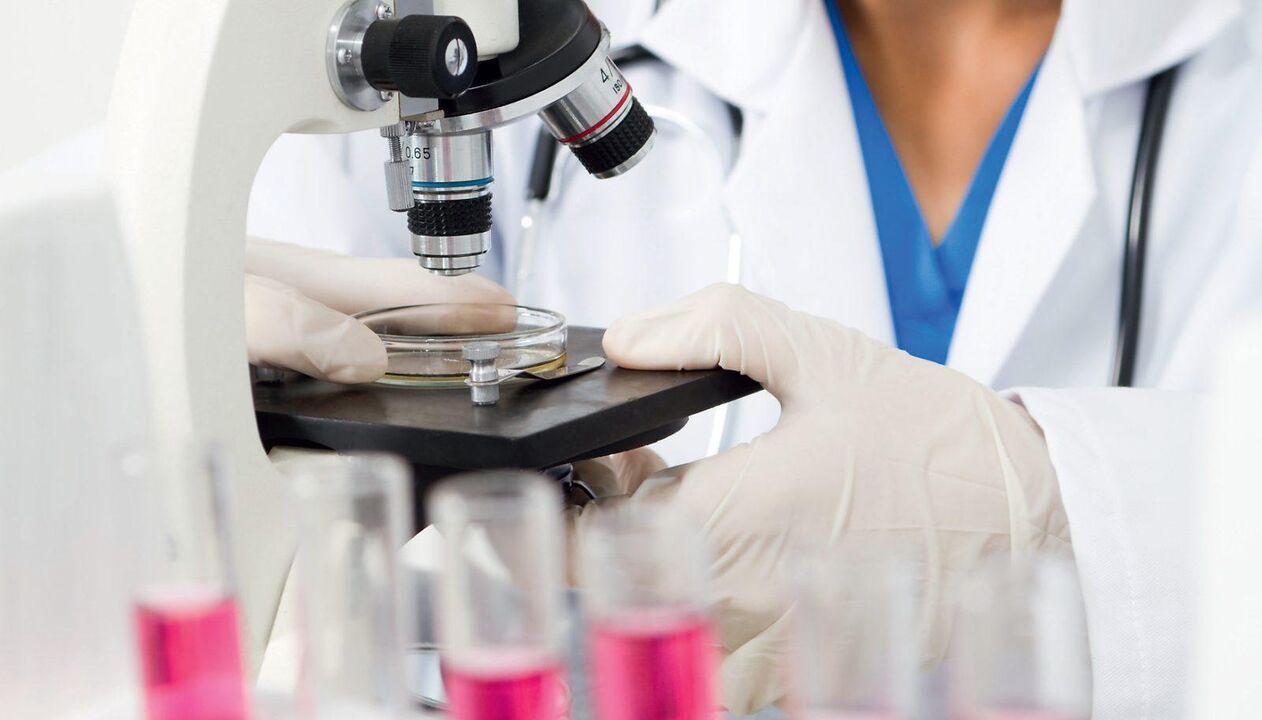
To make an accurate diagnosis, specialists conduct a mandatory visual examination. The probability of developing lichen is excluded, and the type of plaques is determined in order to select the optimal treatment option and prescribe the most effective modern drugs. In almost all cases, a scraping is performed and instructions for the examination are given.
Competently developed and approved drug therapy can not only eliminate the bright manifestations of skin diseases, but often has a positive effect.
Drug therapy
At the moment, there is no treatment that will completely cure psoriasis. At the same time, there are a large number of drugs and a different plan of supportive procedures that can stop the development of pathology. The main thing is to get a comprehensive treatment regimen from an experienced doctor and strictly follow the prescribed therapy and the doctor's recommendations.
Essential external drugs
One of the main symptoms of this disease is the formation of plaques in the body. Such formations not only cause physiological discomfort, but represent a rather unpleasant cosmetic and aesthetic defect. Very often it is quite difficult to hide it. Therefore, one of the important and integral components of the elimination of the disease is the means of therapy used externally. Treatment without various modern gels, pastes, creams, sprays and ointments will not give a positive result.
Hormonal external agents
To treat or stop the disease as much as possible, doctors use drugs intended for external use. We are talking about different medicinal compositions and ointments. In the process of developing the main therapy, hormonal drugs of different intensities of influence are prescribed.
Experts call these drugs topical glucocorticosteroids. The action of such drugs is based on the ability of synthetic medicinal analogues of hormones produced by the adrenal glands. They suppress the immune system in general and reduce inflammation.
The means of such a plan quickly eliminate unpleasant itching and other symptoms of the disease. Medicines in this category should be consulted when absolutely necessary. The reason is that the drugs are characterized by serious side effects based on the suppression of immune responses. Also, drugs in this category cause a certain addiction, on the basis of which it is necessary to constantly increase the previously established dose.
Non-hormonal creams and ointments
No less effective are non-hormonal agents intended for external use. They contain the following components:
- Vitamin D;
- Zinc is activated in a special way. Relieves inflammation, eliminates itching and various redness.
Ointments are characterized by quite a significant advantage. The main one is the possibility of a minimal expense and a longer exposure. It is considered that the only contraindication is its application to formations that heal slowly and that cry.
Creams in this category are optimal for all types and categories of pathological formations. They are much easier to apply and do not require the use of protective dressings, as they do not stain clothing.
If you need to treat your scalp, it will be much easier to use sprays with a special built-in applicator. These products do not leave a greasy residue and do not cause clumps of hair.
Ointments for auxiliary purposes.
Drugs are quite popular at the moment, in the general composition of which there is ordinary tar and pharmacy solidol. Dermatologists prescribe products in which each component is present separately. Tar in the form of a cream can be found in a separate version.
There are many different aids that do not belong to the category of hormones and differ in the composition and nature of the effect. Here are some of the most popular and powerful categories:
- Means for external use only, made of zinc. Preparations containing active zinc are considered the most basic drug for high-quality external therapy. Human skin is a special deposit of zinc. A deficiency of this metal can cause a deterioration in the general condition of the entire surface of the epidermis. Medicines made with zinc are very effective in the healing process of psoriasis and allow to restore the barrier functions of the skin much faster. At the same time, the products reduce unpleasant and debilitating itching and provide a unique strong antibacterial and anti-inflammatory effect.
- Ointments with ichthyol, Naphthalan oil. These drugs are used in the treatment of various skin conditions. They are characterized by a special absorbent and predominant softening effect. This is what contributes to the rapid healing of plaques and also reduces the manifestations of inflammation. Preparations of this type are distinguished by a pungent odor, and some leave traces.Such drugs can cause an unpleasant allergic reaction in the patient.
- Permissive compositions made on tar. There is an opinion that tar seriously slows down unnatural cell division, allows you to quickly exfoliate scabs, is characterized by a unique anti-inflammatory and antiseptic effect predominant. The downside to tar drugs is their pungent smell. It significantly complicates the use of conventional ointments. Long-term use of the drug can cause severe burns.
- Moisturizers. Medications in this category are considered for the most part assisting in the elimination of psoriasis. These drugs are ideal for removing the dryness of the epidermis of the skin, which can be not only a consequence of the pathology itself, but the result of the daily use of drugs and various medical procedures. If the drugs listed above cannot be purchased, you can replace them with high-quality vegetable oil and baby cream.
- Modern hydroxyanthrone. Such drugs significantly slow down unnecessary cell division. This allows you to effectively prevent the growth and spread of formations, as well as reduce the activity of pathological effects. These tools are very often produced in the form of special pencils. During application, it is important not to accidentally apply to healthy, undamaged skin.
- Phytopreparations. We are talking about different infusions of medicinal plants. The leaves of calamus, pharmacy celandine, helenium and blackberry are optimal for eliminating psoriasis. The listed plants contain substances that have a unique anti-inflammatory and healing effect. Properly prepared infusions can be used as lotions or plaque lubricants. These drugs are usually well tolerated by patients, but the overall degree of effectiveness can be unpredictable.
- Modern creams that contain vitamins, made from derivatives of the beneficial vitamin D3, as well as retinoids. Patients with similar skin diseases are advised to rest in resorts with sufficiently high solar activity.
- Keratolytics. They are used as the main means of effective external use in the elimination of psoriasis. The main action of the drug is to soften the upper crusts of the plaques while accelerating their overall healing.
Without exception, all medications must be prescribed by a dermatologist. Self-medication can lead not only to the absence of a positive therapeutic effect, but to the appearance of quite serious complications.
Injections and tablets
For the treatment of a different plan of dermatological diseases in modern pharmaceuticals, there are many injections and tablets. Many can have quite a significant effect on the body. All drugs can be divided into several categories of effects:
- Quick removal of inflammation;
- Antihistamines;
- Means to reduce immunity;
- A drug that is prescribed to improve skin regeneration;
- A drug used to reduce the proliferation of cellular elements. Such suppression of cells in the lesions leads to an automatic reduction of the lesions;
- Revitalizing agent to improve cellular respiration. The drug is administered exclusively by drip.
As a complement, the doctor prescribes a different plan of auxiliary drugs.They are intended to improve the functioning of internal organs, significantly reduce side effects and accelerate the process of restoring the overall surface of the skin. We are talking about vitamins, hepatoprotectors and sorbents necessary to eliminate accumulated toxins.
When treating psoriasis with various medications prescribed by a doctor, the patient may experience adverse reactions. Among them, the following stand out:
- Allergic manifestations;
- Headache;
- A different plan of violations in the gastrointestinal tract;
- Kidney failure;
- The appearance of herpes or stomatitis;
- Decrease in the body's immune forces.
If such phenomena occur, it is worth changing the prescribed drugs for more gentle and effective ones.
Psoriasis injections and pills should be prescribed exclusively by a highly qualified specialist after a complete medical examination.
Vitamin supplements for psoriasis
In the complex treatment of this pathology, it is imperative to use different vitamins. Its main objective is the regulation of metabolism. The most effective and efficient include the following:
- Vitamin A - quickly restores the elasticity of the skin, contributes to its optimal regeneration, and also significantly increases the protective functions of the skin;
- Vitamin B1: allows cells to efficiently assimilate fats and carbohydrates;
- Vitamin B6 supplements: capable of forming red blood cells. In addition, the vitamin is responsible for the metabolism of proteins;
- B12 vitamin. It allows you to assimilate proteins effectively and is also involved in the formation of erythrocytes;
- Common folic acid: it is directly responsible for the immune system and the circulatory system;
- Vitamin E: promotes the rapid absorption of vitamin A.
These vitamin supplements do not require a prescription. In the pharmacies of modern cities, you can easily buy any vitamin complex at different prices. There are quite expensive drugs and there are also more affordable ones.
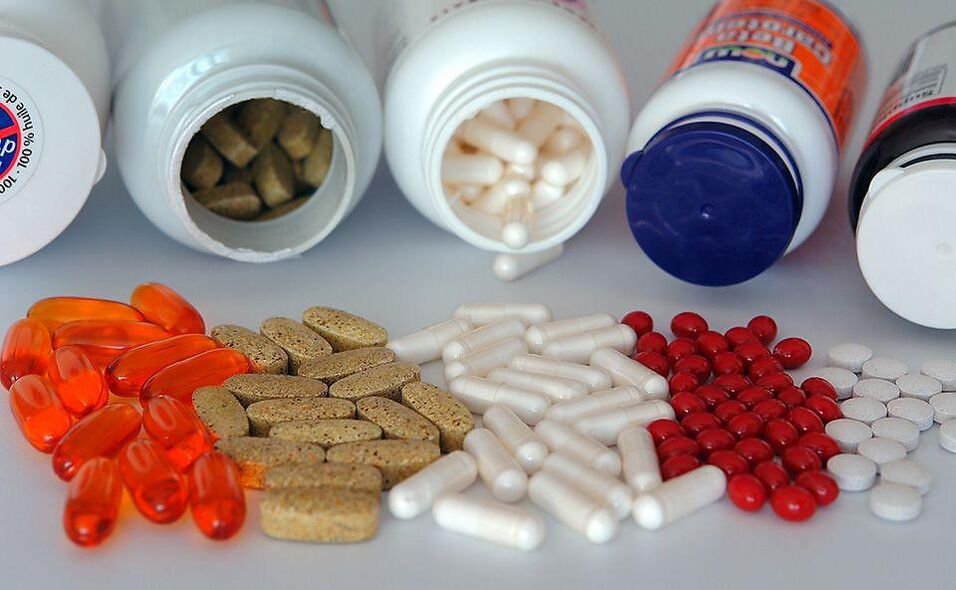
These supplements should not be taken by children, as well as in the presence of individual intolerance.
Hormonal pills
It may seem that glucocorticosteroids, that is, hormonal tablets, are no less effective than ointments and creams in this category. They are absorbed very quickly and immediately begin their action associated with the suppression of immunity. In the process of effectively fighting the disease, tablets have the following positive effects:
- Elimination of inflammation;
- Get rid of itching;
- Silence the pain;
- Elimination of puffiness;
- Prevention of epidermal rejection.
In many patients, the medication is highly addictive and shortens the overall periods of remission.
The dose and treatment regimen with hormonal pills is strictly individual for each person. They must be selected by an experienced dermatologist.
Shampoos for the treatment of psoriasis
To cure the manifestations of the disease under the scalp, it is worth using shampoos prescribed by your doctor. Among the best remedies for psoriasis plaques on the body and on the surface of the head, the following categories of similar compositions can be noted:
- Tar. Quickly relieves irritation and unpleasant peeling of the skin.
- Modern antifungal agents. They effectively cope with a different plan and the degree of development of fungal pathologies.
- Healing shampoos. Most of the medicinal mixtures that are distinguished by their optimal efficacy have zinc in their total composition. Such compositions have a unique antimicrobial and antimicrobial effect on the body.
- Cosmetic preparations. They have a beneficial effect on the scalp. Dandruff is removed quickly enough after application and dryness is removed.
Shampoos do not significantly affect the dermatosis patient. Therefore, they are used as an adjunct to the main form of treatment.
Home remedies
Along with the main methods aimed at eliminating skin pathology, many doctors prescribe folk remedies. They should be consumed strictly after consulting your doctor. Among the most effective means of alternative treatment are the following:
- Homemade healing ointment. To prepare it, you need to take 200 g of butter, put it in a saucepan and immediately put it on the stove. After that, add 10 grams of propolis to the composition. The mixture is boiled for 15 minutes and then filtered. The resulting medicine should be applied to the painful areas two or three times a day;
- Celandine. The powder of this plant is mixed with petroleum jelly, taken in equal amounts. The mask is applied to the plates for about two to three days, then it is completely removed from the surface of the epidermis. The pause between treatment measures is four full days;
- Turnip broth or infusion. You will need to take a tablespoon of dried herbs and pour a glass of boiling water over it. As an applied remedy, after an hour, you can use a quarter glass of broth.
Home remedies can have a positive effect in the initial stage of problem development or as an adjunct to complex therapy.
Hardware treatment
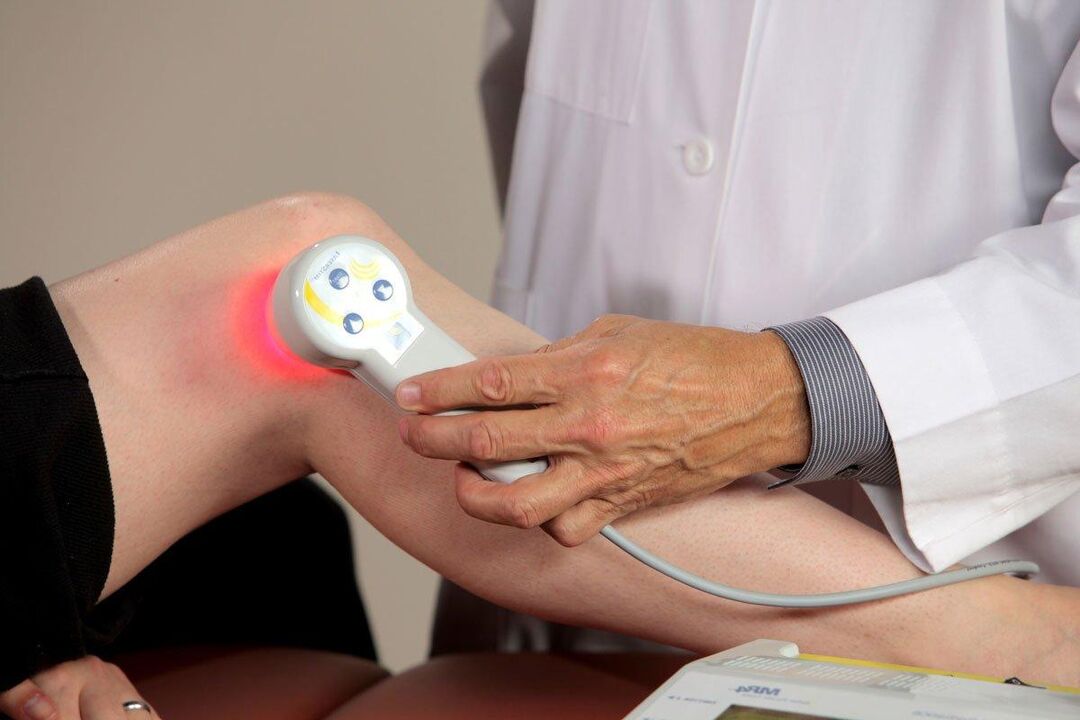
The apparatus treatment of the disease uses various equipment as an optimal auxiliary tool. Among the most effective exposure options are:
- High-quality hardware ultraviolet radiation. It is used simultaneously with the most effective drugs and separately from them. The drug can provide a unique antibacterial effect in the body, provides long-term remission, and does not reduce the body's defenses at all. UV treatment is a completely new way to fight the disease.
- Laser therapy. Such an effect will quickly relieve a person from psoriasis plaques and for a fairly long period of time. The tool can be used without the simultaneous use of drugs. The impact on injuries is made exclusively in xenon and halogen.
- Effective cryotherapy. This procedure is based on the application of a cold temperature. A person is placed in a special chamber where the temperature is below 100-110 degrees. In it, you should spend a few minutes, not more. According to the results of this effect, the number of lesions in a sick person decreases, the itching is completely eliminated.
Physiotherapy, like drugs for the treatment of psoriasis, is used exclusively on the recommendation of a doctor and strictly in accordance with his recommendations.
conclusion
The best remedy for psoriasis is usually selected separately for each patient, that is, strictly individually. Treatment of this pathology should be approached comprehensively, using not only effective pills, but also modern sprays and ointments. To achieve an optimal result, you must strictly follow the recommendations of the attending physician, who will prescribe the treatment after the approved examination.























